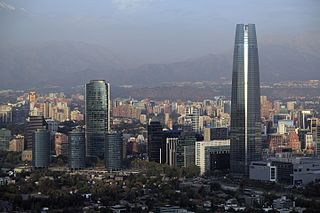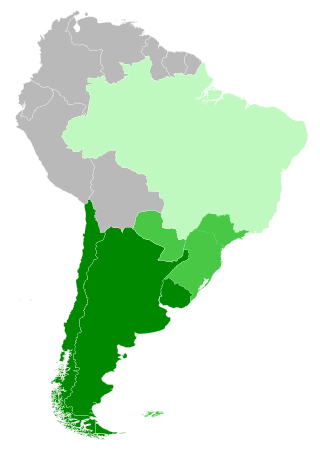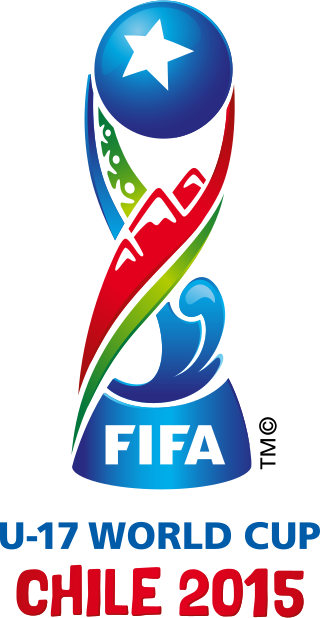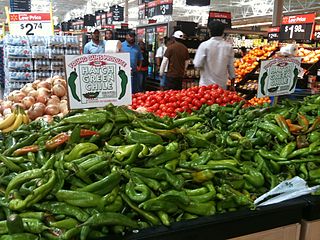
Chile, officially the Republic of Chile, is a country in western South America. It is the southernmost country in the world and the closest to Antarctica, stretching along a narrow strip of land between the Andes Mountains and the Pacific Ocean. Chile had a population of 17.5 million as of the latest census in 2017 and has a territorial area of 756,102 square kilometers (291,933 sq mi), sharing borders with Peru to the north, Bolivia to the northeast, Argentina to the east, and the Drake Passage to the south. The country also controls several Pacific islands, including Juan Fernández, Isla Salas y Gómez, Desventuradas, and Easter Island, and claims about 1,250,000 square kilometers (480,000 sq mi) of Antarctica as the Chilean Antarctic Territory. The capital and largest city of Chile is Santiago, and the national language is Spanish.

The economy of Chile operates as a market economy and is classified as a high-income economy by the World Bank. It is recognized as one of the most prosperous countries in South America, leading the region in areas such as competitiveness, income per capita, globalization, economic freedom, and low levels of perceived corruption. Despite its prosperity, Chile experiences significant economic inequality, as reflected by its Gini index, though this is close to the regional average. Among Organisation for Economic Co-operation and Development (OECD) countries, Chile has a robust social security system, with social welfare expenditures amounting to approximately 19.6% of GDP.

Since its return to democracy in 1990, Chile has been an active participant in the regional and international arena. Chile assumed a two-year non-permanent position on the UN Security Council in January 2003 and was re-elected to the council in October 2013. It is also an active member of the UN family of agencies, serving as a member of the Commission on Human Rights and participating in UN peacekeeping activities. Chile hosted the second Summit of the Americas in 1998, was the chair of the Rio Group in 2001, hosted the Defense Ministerial of the Americas in 2002, and the APEC summit and related meetings in 2004. In 2005 it hosted the Community of Democracies ministerial conference. It is an associate member of Mercosur and a full member of APEC. The OECD agreed to invite Chile to be among four countries to open discussions in becoming an official member.

South America is a continent entirely in the Western Hemisphere and mostly in the Southern Hemisphere, with a considerably smaller portion in the Northern Hemisphere. It can also be described as the southern subregion of the Americas.

Salvador Guillermo Allende Gossens was a Chilean socialist politician who served as the 28th president of Chile from 1970 until his death in 1973. As a socialist committed to democracy, he has been described as the first Marxist to be elected president in a liberal democracy in Latin America.

Santiago, also known as Santiago de Chile, is the capital and largest city of Chile and one of the largest cities in the Americas. It is located in the country's central valley and is the center of the Santiago Metropolitan Region, which has a population of seven million, representing 40% of Chile's total population. Most of the city is situated between 500–650 m (1,640–2,133 ft) above sea level.

The Southern Cone is a geographical and cultural subregion composed of the southernmost areas of South America, mostly south of the Tropic of Capricorn. Traditionally, it covers Argentina, Chile, and Uruguay, bounded on the west by the Pacific Ocean and on the east by the Atlantic Ocean. In terms of social, economic and political geography, the Southern Cone comprises Argentina, Chile, Uruguay and Paraguay, and sometimes includes Brazil's four southernmost states.

The jalapeño is a medium-sized chili pepper pod type cultivar of the species Capsicum annuum. A mature jalapeño chili is 5–10 cm (2–4 in) long and 25–38 mm wide, and hangs down from the plant. The pungency of jalapeño peppers varies, but is usually between 4,000 and 8,500 units on the Scoville scale. Commonly picked and consumed while still green, it is occasionally allowed to fully ripen and turn red, orange, or yellow. It is wider and generally milder than the similar Serrano pepper.

The Chile national football team, nicknamed La Roja, represents Chile in men's international football competitions and is controlled by the Federación de Fútbol de Chile which was established in 1895. Chile has appeared in nine World Cup tournaments and were hosts of the 1962 FIFA World Cup where they finished in third place, the highest position the country has ever achieved in the World Cup.

Club Universidad de Chile is a professional football club based in Santiago, Chile, that plays in the Primera División.

Club de Deportes Cobreloa S.A.D.P., commonly referred to as Cobreloa, is a Chilean football professional club based in Calama, Región de Antofagasta, Chile. They compete in the Primera División. The club's home ground is the Estadio Zorros del Desierto.

A commune is the smallest administrative subdivision in Chile. It may contain cities, towns, villages, hamlets as well as rural areas. In highly populated areas, such as Santiago, Valparaíso and Concepción, a conurbation may be broken into several communes. In sparsely populated areas, conversely, a commune may cover a substantial rural area together with several settled areas which could range from hamlets to towns or cities.
Same-sex marriage has been legal in Chile since 10 March 2022. The path to legalization began in June 2021 when President Sebastián Piñera announced his administration's intention to sponsor a bill for this cause. The Chilean Senate passed the legislation on 21 July 2021, followed by the Chamber of Deputies on 23 November 2021. Due to disagreements between the two chambers of the National Congress on certain aspects of the bill, a mixed commission was formed to resolve these issues. A unified version of the bill was approved on 7 December 2021. President Piñera signed it into law on 9 December, and it was published in the country's official gazette on 10 December. The law took effect 90 days later, and the first same-sex marriages occurred on 10 March 2022. Chile was the sixth country in South America, the seventh in Latin America and the 29th in the world to legalize same-sex marriage.

Chileans are an ethnic group and nation native to the country of Chile and its neighboring insular territories. Most Chileans share a common culture, history, ancestry and language. The overwhelming majority of Chileans are the product of varying degrees of admixture between European ethnic groups with peoples indigenous to Chile's modern territory. Chile is a multilingual and multicultural society, but an overwhelming majority of Chileans have Spanish as their first language and either are Christians or have a Christian cultural background.

Augusto José Ramón Pinochet Ugarte was a Chilean military officer who was the dictator of Chile from 1973 to 1990. From 1973 to 1981, he was the leader of the military junta, which in 1974 declared him President of the Republic and thus the dictator of Chile; in 1980, a referendum approved a new constitution confirming him in the office, after which he served as de jure president from 1981 to 1990. His time in office remains the longest of any Chilean ruler.

The Atacama Desert is a desert plateau located on the Pacific coast of South America, in the north of Chile. Stretching over a 1,600-kilometre-long (1,000-mile) strip of land west of the Andes Mountains, it covers an area of 105,000 km2 (41,000 sq mi), which increases to 128,000 km2 (49,000 sq mi) if the barren lower slopes of the Andes are included.

The 2015 FIFA U-17 World Cup was the sixteenth tournament of the FIFA U-17 World Cup, held in Chile from 17 October to 8 November 2015.

Chile competed in the 2015 Pan American Games in Toronto, Ontario, Canada, from July 10 to 26, 2015.

New Mexico chile or New Mexican chile is a cultivar group of the chile pepper from the US state of New Mexico, first grown by Pueblo and Hispano communities throughout Santa Fe de Nuevo México. These landrace chile plants were used to develop the modern New Mexico chile peppers by horticulturist Fabián García and his students, including Roy Nakayama, at what is now New Mexico State University in 1894.

Chile competed at the 2016 Summer Olympics in Rio de Janeiro, Brazil, from 5 to 21 August 2016.















